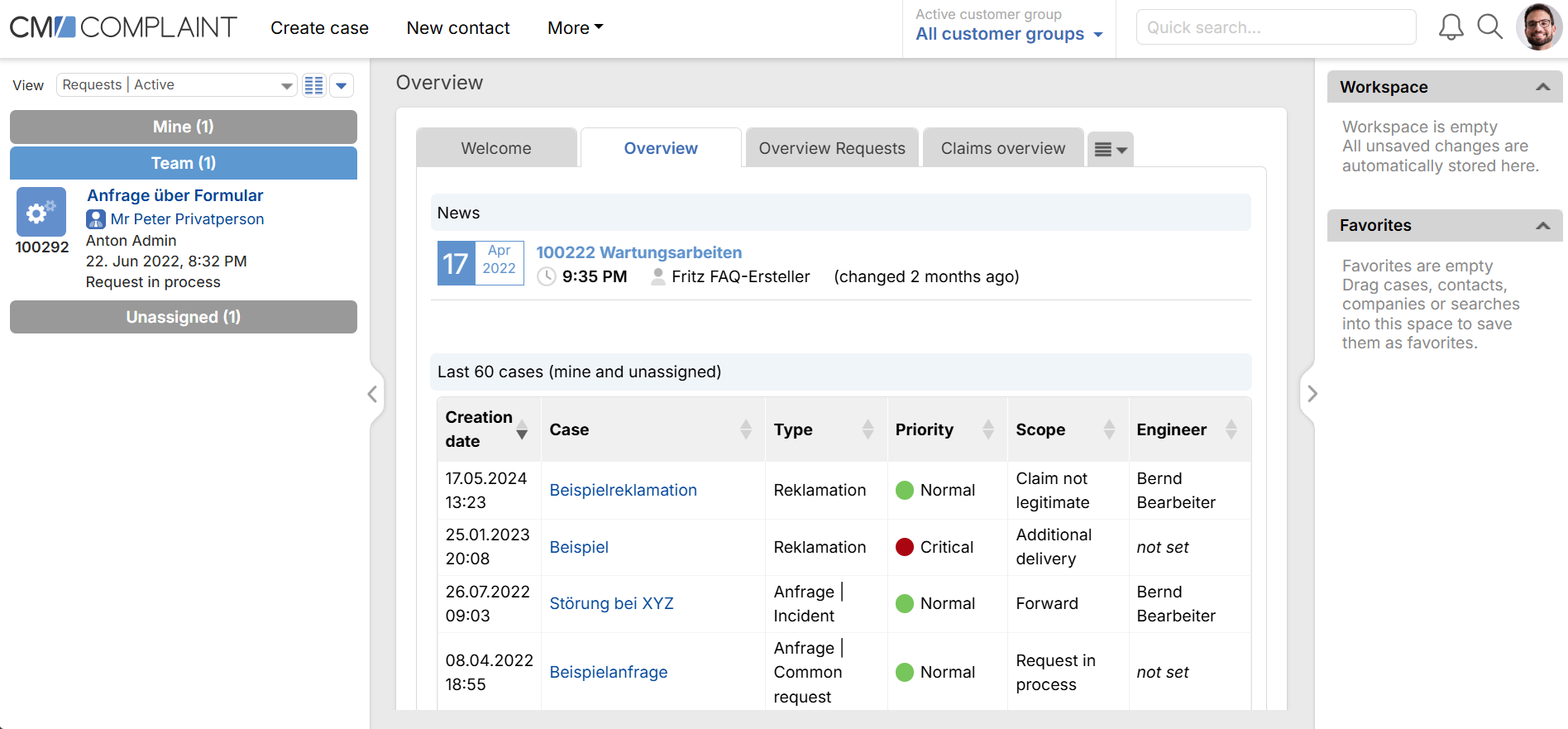CM/Customer Service
ConSol CM/Customer Service is a comprehensive solution for handling general enquiries. Every customer enquiry or complaint is a process. For handling more complex enquiries, additional tasks can be created and forwarded to other agents. The solutions can be added to a knowledge base as FAQs. CM/EBIA is integrated into the dashboard for reporting and evaluation. Important information can be published as news items.
Getting started
Login and integrated tutorial
Log in by entering a user name and password. The following users are available in demo environments:
- serviceUser: All permissions for requests, tasks, customer data and resources; read permissions for FAQs and news
- superuser: All permissions for approvals, requests, tasks, customer data and resources; read permissions for FAQs and news
- faqNewsUser: All permissions for FAQs and news
When you log in with the user serviceUser, you can click on Start tutorial at the bottom of the screen to view a short tutorial for initial orientation.
Processes and cases in CM/Customer Service
CM/Customer Service has three input channels for creating procedures:
- CM/Track customer portal: Contacts can submit enquiries using a form in the customer portal.
- Email: Contacts can send emails to the support address.
- Manually: As the agent, you create a transaction manually, e.g. if a contact has called you on the phone.
There are several types of processes in CM/Customer Service:
- Request: All types of customer requests can be handled in a streamlined process, see Request handling processes
- Task: Tasks are individual steps that must be performed to process an enquiry, see Tasks
- News: News items are used to inform customers and employees about new developments, product recalls or other innovations. External news for customers is published in CM/Track. Internal news for employees is displayed directly on the start page in the Web Client, see News
- FAQ: Frequently Asked Questions show solutions to known problems and provide a knowledge base with instructions. External FAQs for customers are published in CM/Track. Internal FAQs for employees are available in the Web Client directly in the processes that deal with similar topics, see FAQs
Each process type has its own process. The processes are generated and linked to each other during the course of the process, so that the relationships are immediately apparent and can be taken into account during processing. This enables automation and increases clarity, for example:
- The status of the linked tasks is displayed directly in the process, so that the processing progress is quickly apparent.
- Requests can be split and merged as needed.
The processes form the basis for authorisations. You can specify which process each individual processor should have access to.
User interface of CM/Customer Service
Next, familiarise yourself with the user interface. The layout corresponds to that of the standard product ConSol CM, for which comprehensive documentation is available:
- Layout of the page with the main area in the centre, task list on the left and activities on the right, see Elements of the page
- Structure of a process with different areas containing different data and enabling actions, see Object sections.

Next steps
Under Communicating about cases you will find a detailed description of the various options for communicating with contacts and colleagues. The various actions for Work on cases apply regardless of the type of transaction. The process-specific steps are listed under Request handling processes and General process.
The customer portal, where customers can submit enquiries and view their tickets, is described in CM/Track.
In addition to the processes, CM/Customer Service has a database with so-called resources. Click on the Resource Pool link in the menu bar to manage these, see Resources. The standard includes a generic data model for products and assets. Resources can be linked to the associated processes and contacts. The data models can be adapted or expanded as required.
The standard processes and data models can be adapted or expanded as required. It is also possible to define new processes.